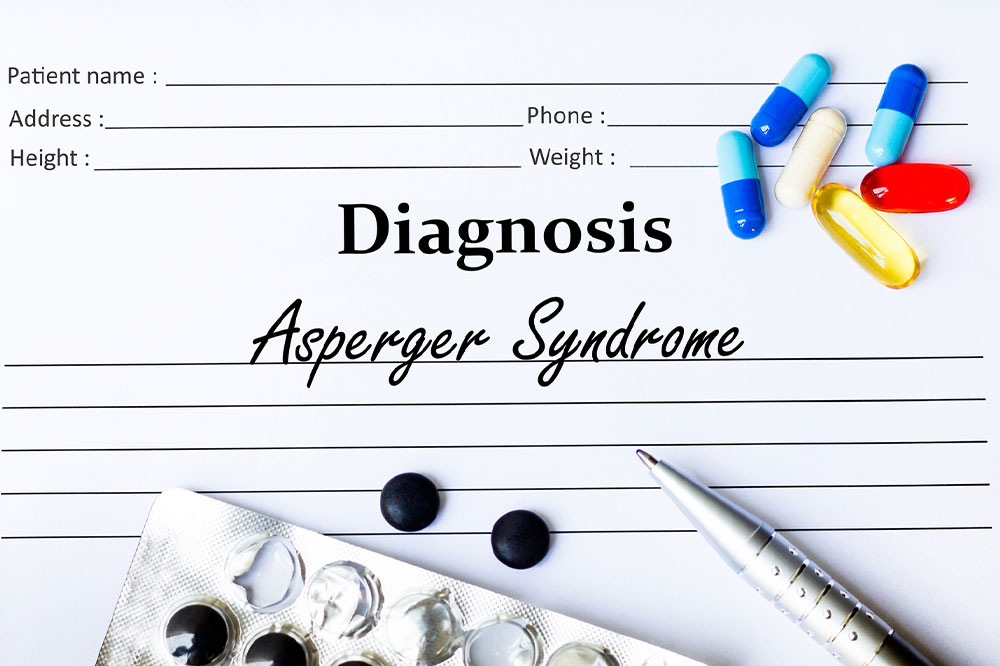Asperger’s Syndrome – Signs, Diagnosis and Treatment Options
Asperger’s syndrome is a neurodevelopmental disorder that affects a person’s ability to socialize and communicate effectively with others. They often have difficulty understanding social cues and emotional nuances in conversations. The disorder is also characterized by restricted and repetitive patterns of behavior and interests. While it shares some similarities with autism, children with Asperger’s typically have fewer issues with speaking and do not experience the same delays in cognitive development.

Signs of Asperger’s in children
Difficulty with social interaction – Children with Asperger’s often may not understand nonverbal communication like facial expressions and body language, and they may have trouble reading social cues. As a result, they may appear to be aloof or uninterested in others.
Lack of eye contact and facial expressions – This is one of the most common signs and can be interpreted as disinterest or even rudeness, when the child may simply be struggling to process what they are seeing. In addition to a lack of eye contact, Asperger’s children may also have difficulty with facial expressions and body language.
Repetitive behaviors – While some of these behaviors may be harmless, such as rocking back and forth or twirling their hair; others can be more harmful, such as self-injurious behaviors or compulsively stealing things. If a child has any type of repetitive behavior that is causing them distress or interfering with their daily life, it’s essential to seek help from a professional.
Overwhelming sensitivity – If a child is too sensitive to sounds, smells, or textures, it could be a sign of Asperger’s. Pay attention to the child’s sensitivities and see if they impact their quality of life. If a child is constantly agitated by sound, touch, smell, or visual stimuli, it might be time to talk to a doctor about Asperger’s.
Persistent fixations on interests or topics – Since it is a form of autism, children with Asperger’s syndrome may become obsessed with a particular subject, such as dinosaurs or train schedules. They may also become fixated on a single hobby, such as collecting stamps or playing chess.
Struggles with change or transitions – One of the most common signs of Asperger’s in children is their struggles with change or transitions. This can manifest in behavior, such as becoming extremely upset over minor changes, having meltdowns when faced with a change in routine, or being resistant to trying new things.
This struggle with change can often be a source of great stress for the child and their caregivers. Remember that this is a genuine and valid struggle for those with Asperger’s syndrome, so try to be as understanding and accommodating as possible.
There are a few things that one can do to help make changes and transitions easier for the child:
- Give them plenty of notice before a change is going to happen. This will give them time to process the information and start getting used to the idea.
- Make sure they understand what is going to happen and why. Again, this helps with the processing and can make the whole experience less overwhelming.
- Help them create a visual schedule or timeline of what will happen and when; this can be extremely helpful in giving them a concrete way to see and understand the changes.
Intense reactions to minor changes – Asperger’s can cause children to have intense reactions to minor changes. For example, they may become extremely upset if their routine is changed or if they are asked to do something that they don’t want to do. This can make everyday life very difficult for the child and their family.
Other symptoms can be:
- Lack of spontaneous or make-believe play
- Obsessive interests in certain topics
- Repetitive motor mannerisms (flapping hands, spinning, etc.)
- Inflexible thinking patterns and insistence on sameness
- Literal interpretation of language
- Flat, monotonous speech pattern
- Lack of interest in other people
- Difficulty in making friends
- Preference for solitary activities
Talk to a pediatrician if the child displays any of these symptoms. They can refer the child to a specialist for further evaluation. With treatment and support, children with Asperger’s can learn to manage their symptoms and lead happy, successful lives.
Diagnosis
The most common way is through behavior observation and assessment. This can be done by parents, teachers, or other professionals who work with children. Another way to diagnose Asperger’s is through testing, which can include cognitive, developmental, and IQ tests.
Treatment
There is no one set approach. The best treatment will vary depending on the child’s needs and preferences. However, some common treatments for Asperger’s in children include behavior therapy, speech and language therapy, and occupational therapy. While there is no cure for this, early diagnosis and intervention can make a big difference in the child’s development.
Some common therapies include –
Behavioral therapy: This helps children to cope with their symptoms and manage their behaviors.
Social skills training: This therapy can help children with Asperger’s syndrome learn how to interact with others and improve their social skills.
Occupational therapy: This helps improve their fine motor and daily living skills.
Speech therapy: This form of therapy can help children with Asperger’s syndrome improve their communication skills.
Parent training and education: This empowers parents by teaching them about the disorder and how to best support their child.
Parents must educate themselves about the condition; this will help them better understand their child’s needs and how to best support them. Additionally, parents can provide a safe and supportive environment for their child and advocate for their needs within the school system and other community organizations. Finally, parents can connect with other families with children with Asperger’s syndrome to build a supportive community.
Warning signs in adults
Many people with Asperger’s syndrome have above-average intelligence, and they may be skilled in certain areas, such as music or math. However, they typically have difficulty with social skills, and they may be awkward or difficult to talk to.
Some signs and symptoms in adults are:
- Having difficulty understanding or using nonverbal communication cues, such as eye contact, facial expressions, and body language
- Appearing insensitive to the feelings or emotions of others
- Being unable to take another person’s perspective
- Having trouble making or keeping friends
- Striving for excessive orderliness and perfectionism
- Displaying intense interests in particular topics
- Engaging in repetitive behaviors or mannerisms, such as hand-flapping or twirling objects
- Having difficulty understanding abstract concepts or jokes
- Speaking in a monotone voice or with little inflection




